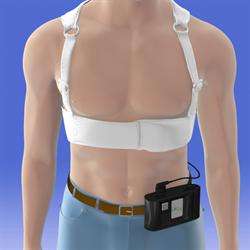Study: Protecting dialysis patients from sudden cardiac death

When people with end-stage kidney disease start dialysis, a treatment that filters the blood to rid the body of harmful waste, extra salt and water, they are at high risk of sudden cardiac death. Researchers at the University of Rochester Medical Center are leading a study focused on reducing sudden death in these patients, the largest such clinical trial ever conducted.
According to Wojciech Zareba, M.D., Ph.D., principal investigator of the trial and director of the University's Heart Research Follow-up Program, the transition from high levels of toxins, electrolytes, and fluid in the blood to lower levels following dialysis can trigger arrhythmias–irregular and potentially dangerous heartbeats. In addition, dialysis patients often have many of the traditional risk factors for heart disease, such as diabetes, hypertension, family history and tobacco use, creating a "perfect storm" scenario for arrhythmias to strike. If untreated, arrhythmias can lead to cardiac arrest and death.
Zareba, together with co-principal investigator Charles A. Herzog, M.D., will test the effectiveness of a wearable cardioverter defibrillator that continuously monitors heart rhythms and delivers a shock to restore an orderly heartbeat. They plan to enroll individuals who are 50 years or older and just starting dialysis, as the risk of sudden death is particularly high during the first six months of treatment.
Herzog, an alumnus of the University of Rochester School of Medicine and Dentistry, is an international authority on cardiovascular disease in patients with chronic kidney disease and served as director of the Cardiovascular Special Studies Center of the United States Renal Data System for 15 years. He is a professor of Medicine at the University of Minnesota and a cardiologist at Hennepin County Medical Center in Minneapolis.
"This work is extremely important because there is nothing available to protect dialysis patients from the risk of cardiac arrhythmias leading to sudden death," said Zareba, professor of Medicine, Cardiology and an international expert on heart rhythm disorders. "We believe that patients will benefit greatly from this device, which is easy to wear. Since it is non-invasive, not requiring surgery, it can be used as long as it's needed and then removed."
The United States Renal Data System reports that sudden cardiac death is the single largest cause of death in dialysis patients, leading to more than 25 percent of all deaths in this group. Zareba already tested the wearable defibrillator on a small number of patients undergoing dialysis and found that it reduced the risk of sudden cardiac death by 60 percent compared to patients who did not wear it.
Zareba and Herzog plan to enroll up to 2,600 dialysis patients in the study; half will be assigned to use the wearable defibrillator and 1,300 will undergo treatment without the device. Daniel A. Gray, M.D., Ph.D., a nephrologist at UR Medicine's Strong Memorial Hospital and Derick R. Peterson, Ph.D., professor in the Department of Biostatistics and Computational Biology were involved in the development of the study and will oversee enrollment of patients in Rochester and analyze study data, respectively.
"This large, multi-centered, randomized trial has the potential to be a landmark study because it will not only test the effectiveness of the LifeVest wearable defibrillator in dialysis patients, but it will also help us identify, going forward, which dialysis patients are at highest risk for sudden death and would therefore benefit most from an implantable cardioverter defibrillator," said Gray, associate professor in the Department of Medicine, Nephrology.
The research is funded by ZOLL, maker of the LifeVest wearable defibrillator that will be tested in the trial.
End-stage kidney disease affects more than 400,000 people in the United States. Due to the aging population and an increasing number of people with type 2 diabetes and high blood pressure–two common causes of end-stage kidney disease–this number is expected to grow to more than 2 million in the next 15 years, according to research published in the journal Kidney International and data collected by the United States Renal Data System.
















